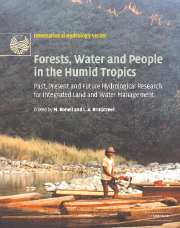 Forests, Water and People in the Humid Tropics
Forests, Water and People in the Humid Tropics Book contents
- Frontmatter
- Contents
- List of contributors
- Foreword
- Preface
- Acknowledgements
- Symposium and Workshop
- Introduction
- Part I Current trends and perspectives on people–land use–water issues
- Part II Hydrological processes in undisturbed forests
- Part III Forest disturbance, conversion and recovery
- Part IV New methods for evaluating effects of land-use change
- Part V Critical appraisals of best management practices
- Conclusion: Forests, water and people in the humid tropics: an emerging view
- Plate section
Part I - Current trends and perspectives on people–land use–water issues
Published online by Cambridge University Press: 12 January 2010
- Frontmatter
- Contents
- List of contributors
- Foreword
- Preface
- Acknowledgements
- Symposium and Workshop
- Introduction
- Part I Current trends and perspectives on people–land use–water issues
- Part II Hydrological processes in undisturbed forests
- Part III Forest disturbance, conversion and recovery
- Part IV New methods for evaluating effects of land-use change
- Part V Critical appraisals of best management practices
- Conclusion: Forests, water and people in the humid tropics: an emerging view
- Plate section
Summary
SUMMARY
The extensive conversion of tropical forests to other land uses during, especially, the last four decades has raised global alarm on the threats posed by continued forest conversion to climatic stability and the hydrological functioning of river basins, next to the well-being of forest dwellers and the conservation of biodiversity. This part consists of nine chapters setting the scene for this book. It starts off with an account of the rates and underlying causes of deforestation in the three main tropical rainforest regions during the last two decades. This is followed by a critique of neo-classical market-based economics which are held responsible for stimulating environmental degradation. The next three chapters (Chapter 3-5) describe the adverse socio-economic consequences of large-scale planned forest conversions for forest dwellers and other poor strata in society in Latin America and South East Asia. After concluding that governments and donor organisations, whilst well aware of tropical environmental degradation, generally have no new ideas on how to mitigate the effects of adverse practices (Chapter 6), the final three chapters highlight ways of using economic theory to improve the negotiating position of upland farming communities and of actively involving these communities in the identification and solving of local environmental problems.
Setting the pan-tropical scene, Drigo discusses how the latest FAO Tropical Forest Assessment and various related efforts (i.e. TREES II high resolution survey) to quantify the extent and rates of tropical deforestation reveal a rather complex picture of a reduction in higher biomass densities during the last two decades, despite different definitions of various vegetation classes used in the respective surveys.
- Type
- Chapter
- Information
- Forests, Water and People in the Humid TropicsPast, Present and Future Hydrological Research for Integrated Land and Water Management, pp. 5 - 8Publisher: Cambridge University PressPrint publication year: 2005


